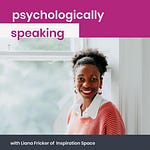How often do we understand what we read?
Psych at the Mic, for the British Psychological Society, is one of my volunteer roles, and I absolutely love hosting these events. There’s always something interesting to learn, and last month in Nottingham was no exception.
We explored the psychology of reading in schools, and one conversation that really stuck with me was about word retrieval and comprehension.
It made me reflect on my own reading habits. How often do I skim unfamiliar words in academic texts (a lot!), relying on context to get the gist without ever fully learning them? Lately, I’ve been challenging myself to pause and actually look those words up, because language shouldn't be a gatekeeper of knowlege and curiousity. I'll admit that before I started doing this I thought the use of complicated words was a bit pompous.. but last weekends word is helping me apprerciate the beauty of the right word for the right occasion, and admit I need to keep learning!
Let me introduce you, drum roll … the word ‘Lacuna’.
If you studied Latin, you might know it comes from lacus (meaning ditch or pit), and in academic writing it signals a gap in knowledge. Have you come across this word before? I was sure that I hadn't. My annoyance that this word popped up in the first paragraph of a paper was moderate, my heart drops a little when I think that a whole paper will be littered with fancy words (aka, longer to read ).
But my curiousity didn't stop there, I did a Ctrl+F search on four of my favourite academic papers.
And yes, lacuna was in one of them (oops!). So this is not a NEW word for me, it's a word I've skimmed over, just like kids in schools when they are left to read on their own, when they aren't encouraged to think about the meaning of the specific word or taught what those words mean.
So maybe I need to mind the gaps in my knowledge a little more.
And the value of this word is that I’ll be glad I looked it up next time I’m battling against a tight word count and need a single word that conveys ‘there is a bit of gap in this literature’
As a parent, I also get to read some wildly funny kids’ books with my nine-year-old, and I’ll admit, those sometimes have words I don’t fully understand either! There’s something humbling and kind of magical about still learning how to read, even as an adult. The Psych at the Mic event was all about pairing children up to read, and also to get them thinking about words they don't know. Perhaps I need to take some of this advice into my Phd weekly sessions with my reading group and ‘fess up when I don’t know what something means exactly.
It also made me think about the season’s podcast theme: the liminal space between thoughts and actions. As we get older, our appetite for risk tends to shrink and we second-guess. We sit with things longer because we’re careful and considered. Sometimes that gap between knowing and doing feels like a chasm.
Psychologically, this tendency to stay safe is well documented. Research suggests that our brains prioritise loss aversion – the desire to avoid negative outcomes, more strongly than seeking gains. One study found that older adults are more likely to focus on avoiding losses than pursuing rewards, a shift linked to changes in emotional regulation and motivation. It’s part of what’s called socioemotional selectivity theory and the idea that as we age, we become more selective about where we invest our energy, and more focused on emotionally meaningful goals.
So maybe pausing to look up a word isn’t just about vocabulary.
Maybe it’s a tiny act of curiosity against certainty, and a way of staying open to something new, even when part of us would rather retreat into what’s already known or familiar?
My encyclopaedic brain seems to have prioritised random facts over learning five different ways to say “mind the gap”. I'm still midly annoyed about fancy words that slow me down, but I’m working on it and I'll admit I can see the joy!
How about you – any new words lately? or any moments where you’ve caught yourself sitting in the space between knowing and doing?
Hit reply – I’d love to know.
P.S. This week’s podcast episode is a bit of a confession: I’ve been saying yes a lot lately, and while I do get genuine joy from volunteering, it’s not always syncing up with my energy levels.
Take a listen to Worn Thin here I’d love to know if it resonates.
📅 Free Adult INSET Session April 22nd
Let’s talk imposter phenomenon.
🗓 Monday 22nd April
🕐 1:00–1:30pm (Youtube)
🎓 A half-hour session for grown-ups, entrepreneurs, creatives, and professionals who feel busy proving themselves
We’re often told that confidence is the key to overcoming imposter experiences. But what if confidence isn’t the answer? What if it’s trust, trust in ourselves, and how trust works with others?
Instead of spending energy proving yourself, what if you focused on building trust in what you already bring to the table?
👩💻 Can’t make it live? No worries, register and I’ll send you the replay.














Share this post